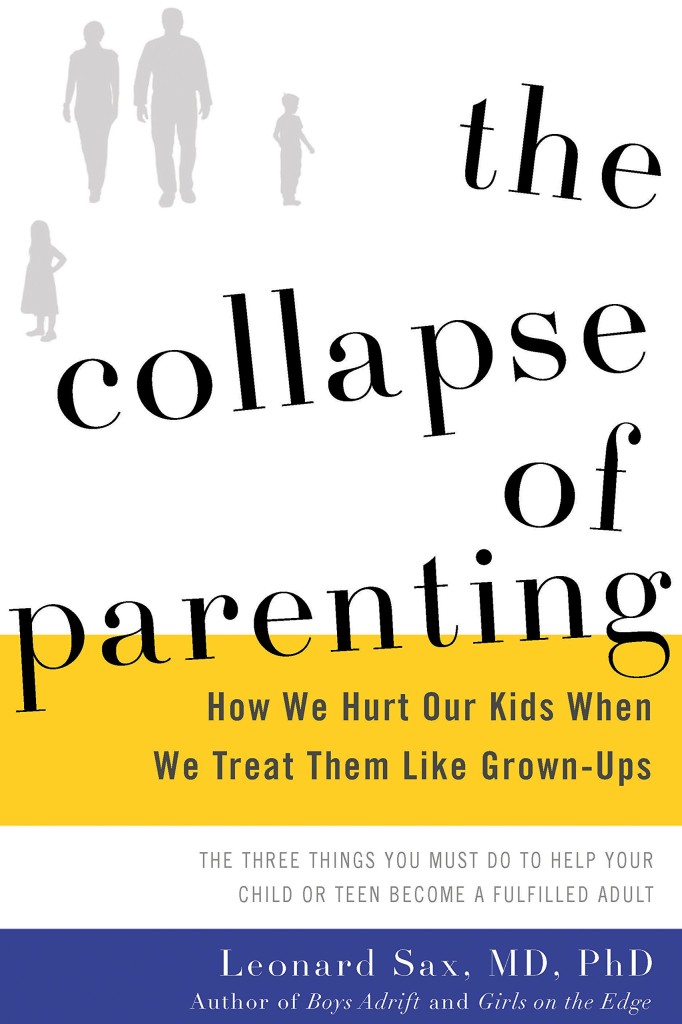I watched a fight take place in an airport concourse a couple of days ago. It’s the kind of fight that’s becoming so common that we’ve all seen it happen in one public place or another. “It’s” those parent/child confrontations that clearly communicate who’s in control in the relationship. In this case, I watched as a cute little two-year-old girl took on her parents over something that she wanted but was not getting. She jumped up and down, screamed her demands over and over, and eventually won-out as her parents caved and gave in. But here’s the question. . . did she really win?

Dr. Sax would say that among parents of children, pre-teens, and teenagers there’s been a massive transfer of authority from parents to their kids. We value our kids’ opinions and preferences too much. . . To the two-year old. . . “How about we change your diaper?” To the eight-year-old. . . “Do you want to go to church with us?” To the thirteen-year-old. . . “Would you like to join us for our family vacation?” He writes, “In many families what kids think and what kids like and what kids want matters as much, or more, than what their parents think and like and want.” Sax believes that we as parents are prone these days to suffer from “role confusion.” And by abdicating our parental authority, kids no longer learn about beliefs and behaviors from their dad and mom. Instead, they learn from their peers. . . who are equally immersed in a culture of disrespect. The result? “If your relationship with your child is governed by your own desire to be loved by him or her, the odds are good that you will not achieve even that objective.” What you wind up with is a selfish, self-centered, narcissistic, and entitled kid. . . who then becomes the same kind of adult.
What are some practical steps we can take to remedy this situation and keep our relationship with our kids in proper perspective? Dr. Sax offers three prescriptions.
First, we must teach humility. The reality is that humility has become the most un-American of virtues. Humility is a virtue taught and modeled by Christ. But in today’s world, we are told to look out for ourselves, think highly of ourselves, and use others as a means to our ends. Teaching our kids to pursue lives of humility leads to gratitude, appreciation, and contentment. Sax says that limiting our teen’s use of social media while requiring them to contribute to the family through chores is a good starting point.
Second, we just enjoy the time we spend with our teenagers. When you are with your teen, devote yourself completely to your teen. Put your phone down. Turn off the TV. Forget your emails. And finally, don’t cram your kid’s life so full of activities that you’ve got no margins for relaxed time to spend together.
And finally, help your teen see that the primary purpose of their education should to prepare them for a life of virtuous living, rather than a life of performing in order to make money. In other words, don’t reinforce the middle-class achievement script, but undermine it instead.
We’re not even through the month of February. . . and The Collapse of Parenting might wind up being my “Book of the Year.”
I love the line, “help your teen see that the primary purpose of their education should be to prepare them for a life of virtuous living . . . “
I absolutely agree with what the doctor is saying. It seems the more we learn about parenting the worse we are getting at it. The average teenager in America is consuming 7 hours of screen media a day. They don’t get enough sleep and can’t concentrate in class. I do believe there is a balance though, especially with teenagers. Our job is to bring them up so that when they are adults they can make good decisions for themselves. If we make all the decisions for them and suddenly at 18 expect them to make good decision it isn’t going to work and they will make bad decisions as a lot of us did when we were young, thankfully and luckily we lived through it.
When we say things like, “you can’t do that because it is my job to keep you safe”, that is perhaps appropriate for pre-teens but it is not teaching our teenagers anything. I tell my teens they can do anything. I say, it is your decision but we must first find a way of making it safe and mitigating for the dangers. This allows us to discuss the dangers with them and look for ways to eliminate or minimise them. If we can’t find a way to minimise them enough then we look to see if it is really necessary for them to go at all. Opening the discussion of the dangers helps them to think about danger in an appropriate way and teaches them to make better decisions.
Not every new parenting idea is wrong, the problem is that there is too much to learn and so much confusion and so many universal truths are just plain wrong. In the past generation there has been so much research, so many new parenting ideas and so much change that the average parent has not caught up. In a few generations time everything should settle down and we will all be better parents for it. People still believe that parenting should be natural and they shouldn’t need to put any effort into learning but to be a great parent today requires an enormous amount of research and personal development.